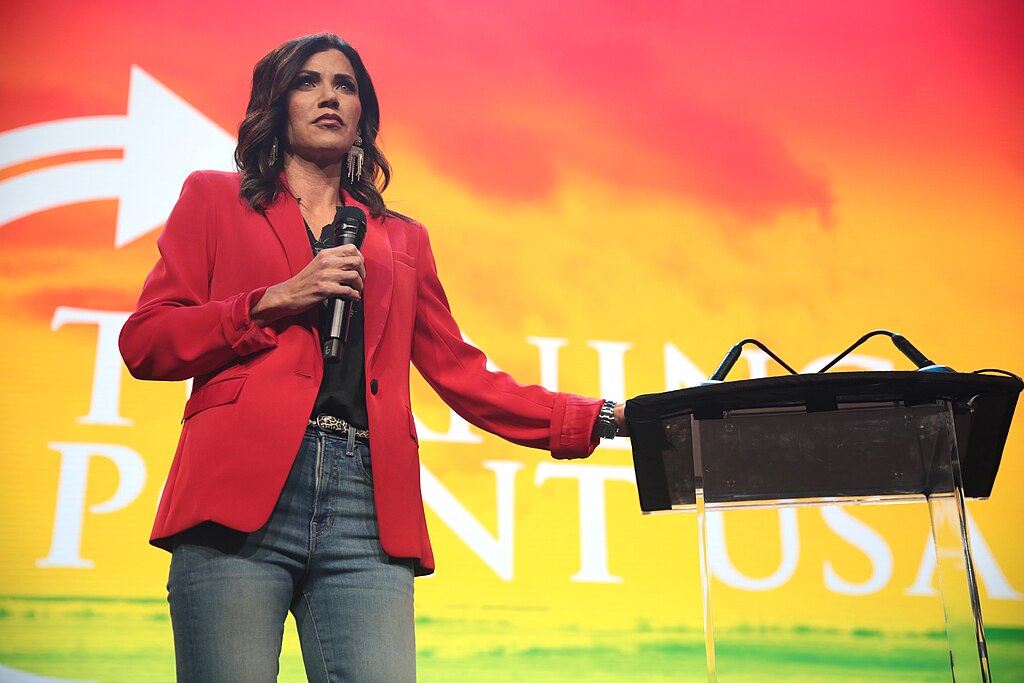
- Details
- By Levi Rickert
Larry Rhoden was officially sworn in as governor of South Dakota on Saturday following the resignation of former Gov. Kristi Noem, who stepped down to assume the role of U.S. Secretary of Homeland Security. Noem’s nomination was confirmed by the U.S. Senate earlier that same day.
With Noem’s move to Washington, D.C., South Dakota tribes are anticipating a fresh start in their relationship with Rhoden, who previously served as lieutenant governor under Noem. Tribal leaders are hopeful for improved relations after years of tension with Noem’s administration.
During her tenure as governor, Noem’s relationship with South Dakota’s tribes was marked by significant conflict. Tensions escalated when Noem, during a town hall meeting, accused tribal leaders of profiting from drug cartels and prioritizing cartels over parenting their children. These comments led to several tribes banning Noem from their reservations. She later doubled down on the claim, asserting that Mexican drug cartels were prevalent on Indian reservations in the state.
Earlier this month, the Flandreau Santee Sioux Tribe lifted its ban on Noem just days before her confirmation hearing for Homeland Security. Tribal President Anthony Reider notified Noem of the decision in a January 14 letter, stating that she had met the tribe’s conditions by addressing her previous statements about tribal members and their children.
Noem’s controversies extended beyond her remarks about Indian Country. In her recently published book, she recounted incidents including killing her 14-month-old wirehaired pointer, Cricket, and an unnamed goat. The book also contained an anecdote about meeting North Korean dictator Kim Jong Un, which Noem and her staff later admitted was fictional and should not have been included.
"Being Governor has been the great honor of my life. Thank you to the people of South Dakota for trusting in me to be your chief executive," Noem wrote in her resignation letter. "God bless South Dakota."
On January 15, 2025, anticipating a change in state leadership, Sisseton Wahpeton Oyate Chairman J. Garrett Renville called for a "reset" in relations with the state during the State of the Tribes address at the State Capitol.
Standing Rock Chairwoman Janet Alkire expressed optimism about collaborating with Lieutenant Governor Larry Rhoden, who would assume the governorship if Kristi Noem’s confirmation went through. According to the nonprofit newsroom South Dakota Searchlight. Alkire noted that Rhoden has shown a willingness to engage with tribes and foster cooperation.
More Stories Like This
Native News Weekly (August 25, 2024): D.C. BriefsUS Presidents in Their Own Words Concerning American Indians
This Day in History – Dec. 26, 1862: 38 Dakota Men Executed by Order of Abraham Lincoln
Merry Christmas 2025
Navajo Man Faces Vehicular Homicide Charge After Child Killed at Navajo Nation Christmas Parade
Help us defend tribal sovereignty.
At Native News Online, our mission is rooted in telling the stories that strengthen sovereignty and uplift Indigenous voices — not just at year’s end, but every single day.
Because of your generosity last year, we were able to keep our reporters on the ground in tribal communities, at national gatherings and in the halls of Congress — covering the issues that matter most to Indian Country: sovereignty, culture, education, health and economic opportunity.
That support sustained us through a tough year in 2025. Now, as we look to the year ahead, we need your help right now to ensure warrior journalism remains strong — reporting that defends tribal sovereignty, amplifies Native truth, and holds power accountable.
 The stakes couldn't be higher. Your support keeps Native voices heard, Native stories told and Native sovereignty defended.
The stakes couldn't be higher. Your support keeps Native voices heard, Native stories told and Native sovereignty defended.
Stand with Warrior Journalism today.
Levi Rickert (Potawatomi), Editor & Publisher


